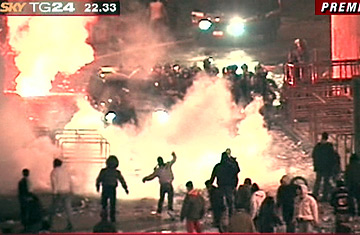
Fans clash with police outside Catania's Angelo Massimino stadium after the Italian first division soccer league match between Palermo and Catania, in Sicily, southern Italy, Friday, Feb. 2, 2007. Palermo beat local rival Catania 2-1 i
But as it has turned out, the confetti raining down and the golden trophy glowing above the head of captain Fabio Cannavaro was just a flickering interlude in what is turning out to be among the darkest periods ever for Italian soccer. The shadow had already been cast before the June-to-July victorious run in Germany, as a referee scandal consumed many of Italy's top league teams. Wire-tapped phone calls revealed that team officials orchestrated referee selection, and everyone from league bosses to politicians to television commentators had a foot in the alleged "system" of influence. The controversy eventually forced Juventus — the New York Yankees of Italian soccer — down to the second division and stripped them of the last two league titles.
But now, the beautiful game has turned even uglier. Italy's long-simmering epidemic of fan violence turned deadly last week when a 38-year-old police officer was killed by rioters outside a stadium in Sicily. Games were cancelled last weekend, and this week the government imposed new measures to curb this hooliganism all'italiana. The policies in fact are largely inspired by the relatively successful British effort to quiet unrest from the notably rowdy spectators in England's football leagues. Among the most immediate effects is that home teams must play in empty stadiums if their security apparatus is inadequate, which means that at least half of Italy's top-division games this weekend are likely to be played only for the television cameras. Additional measures include stiffer penalties for violence inside or outside stadiums, bans on group ticket sales to away games to limit organized " road trips" for hard-core fan clubs, and a crackdown on teams that turn a blind eye to violent supporters.
Still, many wonder if the response will turn out to be just more window dressing in the aftermath of the death of officer Filippo Raciti, a father of two from Catania, Sicily. Initial threats from the government to actually shut down the entire league until security could be guaranteed have given way to the less extreme measures, which turn out to be similar to bills approved by Parliament in the past, but subsequently not enforced. Violence at soccer games has been a weekly affair for the past decade. Fan organizations (known as Ultras) often at the center of riots against police and opposing supporters are known to intimidate team owners into giving them preferential treatment. While some politicians initially spoke of shutting down the league, a more honest, though distasteful assessment was given by the soccer league president: "We are pained, but the show must go on," said lega president Antonio Matarrese. "Soccer must never shut down. Deaths in the soccer system unfortunately are part of this enormous [hooligan] movement."
The violence, though, is just the jack of spades in an Italian soccer world that increasingly looks like a house of cards. Beyond the referee scandal, there have been recent cases of match-fixing, financial improprieties and lingering questions of conflicts of interest. Following the dominance of the Italian league in the 1980s and 1990s, there are even signs that the off-field shenanigans are affecting performance. In the past decade, only one Italian club has claimed a Champions League title (AC Milan in 2003), following a 12-year period that included five titles in the top European competition. And elite international players that used to rush to Italy are now signing up more often with the English and Spanish leagues.
Historically, top Italian political and industrial figures have played central roles in the sport, including the Agnelli family that owns automaker Fiat and Juventus, and billionaire former Prime Minister Silvio Berlusconi, who owns AC Milan. Smaller teams are often owned by top local business figures, who usually lose money to satisfy their sporting passion. But soccer's reach extends across the entire spectrum of Italian life. Following the initial outrage of the officer's death, La Repubblica columnist Giuseppe D'Avanzo put it this way: "If you don't want to break the toy that creates an appetizing consensus for many (in politics, business, media), you need to hypocritically pretend to not see what Italian soccer wants and knows how to be: a world unto itself." Sounds like a religion indeed. And as Italians know as well as anyone, managing the relationship between Church and State is never a simple affair.
